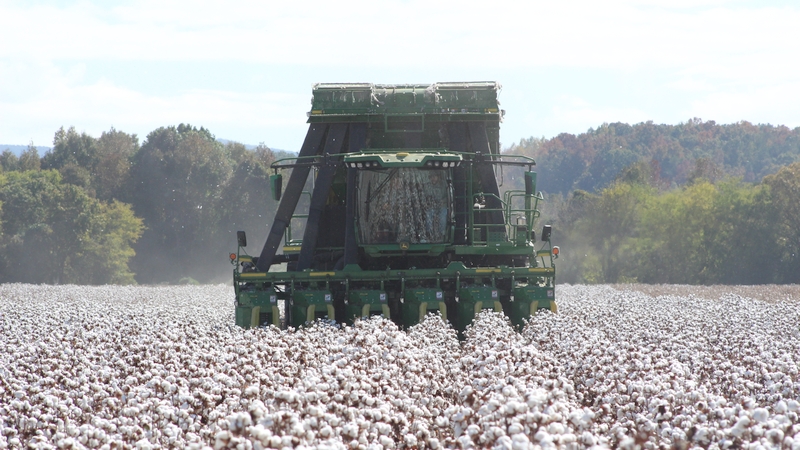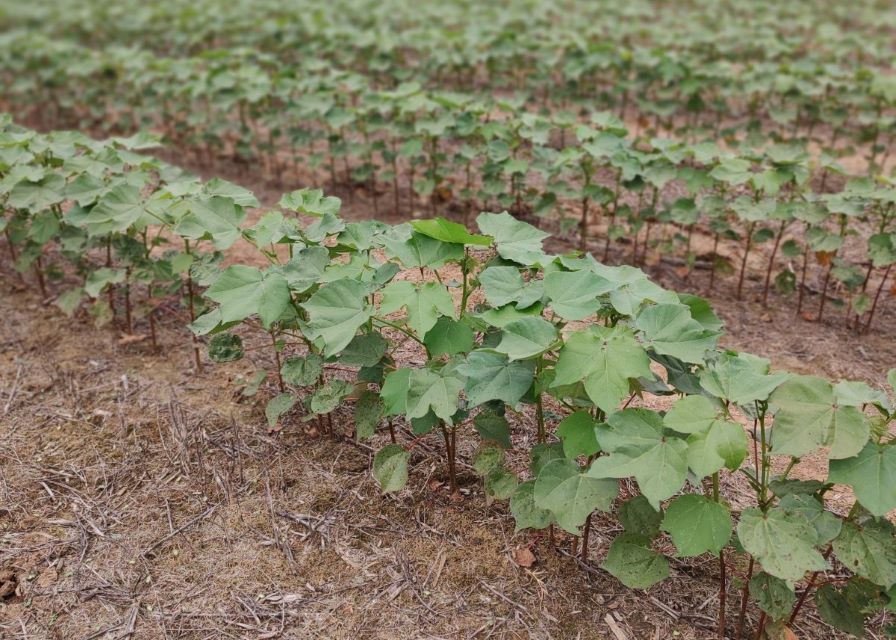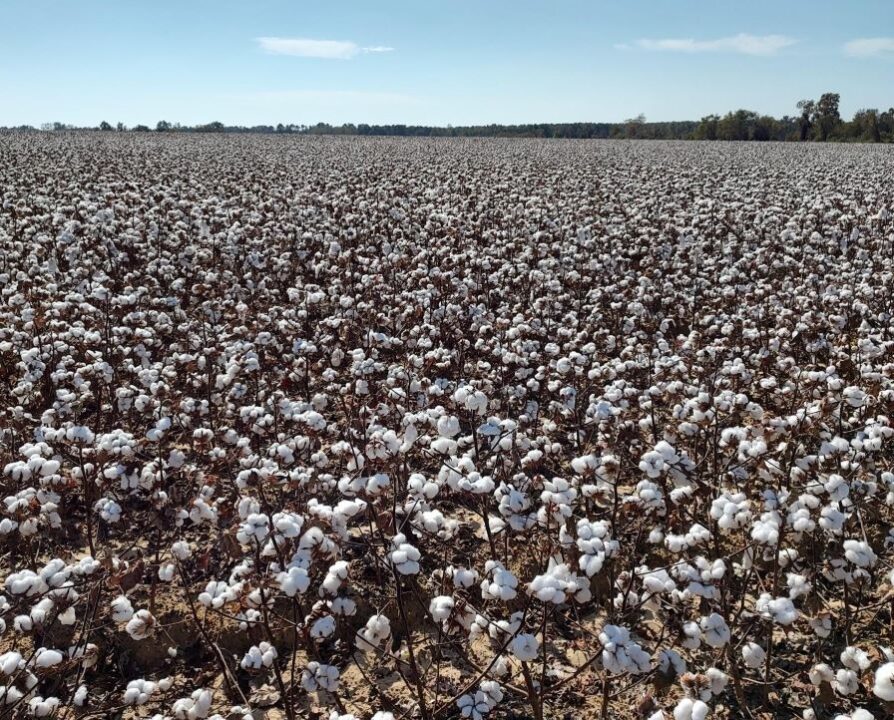Local Service, National Commitment
Homer Tate said he was simply looking around for a way to help himself and his farming operation near the Tennessee River Valley town of Meridianville, AL.
“I got involved in the Alabama Farmers Federation. I was on the Cotton Board, the Alabama Cotton Association and the National Cotton Council,” he says.
When Homer began thinking about stepping down, his son Mike was ready to step up.
“He’s done a better job than me,” says Homer.
Mike is president and a director of Cotton Growers Cooperative Gin and Warehouse in New Market, AL, and is a director of Staplcotn and the Alabama Farmers Cooperative.
He is a graduate of the National Cotton Council’s Cotton Leadership Program and has served on numerous NCC committees. He is currently an NCC delegate, is chairman of the NCC’s Environmental Task Force, and has been an Alabama chairman of the NCC’s American Cotton Producers.
Mike has served numerous other agricultural organizations. He is a director for Cotton Incorporated. He is the incoming president of the Southern Cotton Growers. He is a member of the Madison County Farmers Federation, and the Alabama Boll Weevil Eradication Foundation. Mike also is vice chairman of the state cotton committee of the Alabama Farmers Federation. He is a graduate of Alabama A&M University.
Because of this tireless, selfless service to the cotton industry, the Cotton Grower staff is proud to announce that Mike Tate is the recipient of our Cotton Achievement Award for 2011.
“Mike is an outstanding leader. He comes from a family with a very rich cotton tradition. He’s served in many Cotton Council positions, including being a member of the ACP (American Cotton Producers),” says Craig Brown, vice president of producer affairs for the NCC. “That’s the group that tackles some really difficult issues within the cotton industry; a wide range of issues from pesticide registrations to clean water, clean air, endangered species. It’s a very important committee.
“He is also very active in the state and regional associations,” Brown continues. “He’s an officer of the Southern Cotton Growers, and he’s in line to be president, which is a very prestigious position. Mike has answered every call that we’ve made, and is very deserving of the award.”
Says David Ruppenicker, CEO of the Southern Cotton Growers Association and Southeastern Ginners Association: “Mike is a straight-up guy. His family has an aggressive, well-maintained family farming operation. They’re great people and a well-respected family.
Monty Bain, southeast regional communications manager, Cotton Board says, “Mike is an awfully nice guy and I’ve known him for probably 15 to 18 years. Some of that time I bought his cotton when I worked for Dunavant.
“I know Mike and his dad Homer and his brothers – Steve and Jeff – and their cousin Pat Brown. They’re a tight family, have good Christian values and are very good stewards of the land they farm. “
And finally, Mike Tate says, “I want to say this: I’m involved in all these organizations, and these guys allow me to spend time doing that. We have employees that have been with us a number of years and they know what we’re doing as much as we do. That’s a real benefit for us, and we feel very fortunate to have them.”
Following the Footsteps
“Daddy went to Mississippi State on a basketball scholarship and I guess he stayed about a week,” says Tate. “Then he took a public job for six months before starting to farm. So he started all of this in 1946.
“I went to Auburn for a short period of time, but I graduated from Alabama A&M in 1978. I sort of followed in my Daddy’ s footsteps and came back home to farm, but I stayed in school.”
Tate earned a degree in crop science at Alabama A&M. “It’s agronomy, crop science and plant science,” he explains.
He adds, “I grew up farming, and made my first crop in 1975, right out of high school. My dad always let us play organized sports. But if we wanted to go hunting or fishing, he’d tell us it was a waste of time and had us go to work. Needless to say, none of us are hunters or fishermen.”
Tate Farms has an impressive cotton heritage that goes back several generations. “My dad and grandfather were sharecroppers who were already here,” Homer Tate says.
Mike Tate says, “We worked together as far as our individual farms were concerned, then we formed a legal partnership in ’87.”
U.S. Cotton Growers vs. Foreign Governments
Mike Tate has a unique perspective on the global cotton markets that seem unimpressed by drought-induced record abandonment in Texas, and already low cotton stocks.
“It didn’t play a factor, but I think part of that is what’s happening to all commodities and the effects of macroeconomics we’ve faced the whole year in Europe and even here,” he explains. “And that was not good, and unfortunately that will probably continue. Right now I see that has the biggest obstacle to prices improving. Cotton especially is driven by what economies are doing and whether people have disposable incomes for clothing as opposed to food. So it’s probably going to be the first commodity affected. Fundamentally, all of the commodities are generally good. But the economic news from around the world has depressed fundamentals.”
Because cotton prices in the U.S. blasted their way through the mystical dollar-cotton range with old-crop cotton reaching a high of around $2.40 per pound, and new crop flirting with $1.20, those on the outside looking in can’t fathom continuing a marketing loan program.
“Cotton needs a marketing loan simply because it’s used as a marketing tool, and it’s very important to the cotton industry that we have that marketing tool,” Tate says. “My biggest argument as to why we need some kind of safety net is that we’re not even competing against cotton growers in other countries. Who we’re competing against, more than anybody else now, is other governments – China, India and now Brazil.
“A country like China can control just about everything. China is the biggest grower, the biggest consumer and our biggest customer. And if we don’t have some level of protection, they will. They have the advantage. Those governments are either Communists or Socialists, and they will control it if they can.”
Tate says a good example of what China has done is reflected in the near loss of all U.S. mills. On the retail level, the U.S. still consumes between and 22 million and 23 million bales per year in textiles, but uses only 3 to 4 million bales domestically.
“So most of what we grow has to go off-shore to be processed. We’re still the supplier of last resort,” he explains.
“With the GATT agreement (General Agreement on Tariffs and Trade) that we agreed to back years ago, we eliminated protection on textile products,” he continues. “The reason for that was supposed to assist underdeveloped countries in starting their own textile industries and raise their standard of living. China recognized that and just sort of captured the textile industry. The Chinese government did that, and they can do that with most anything, and they have done with other industries, not just to ag industries.









